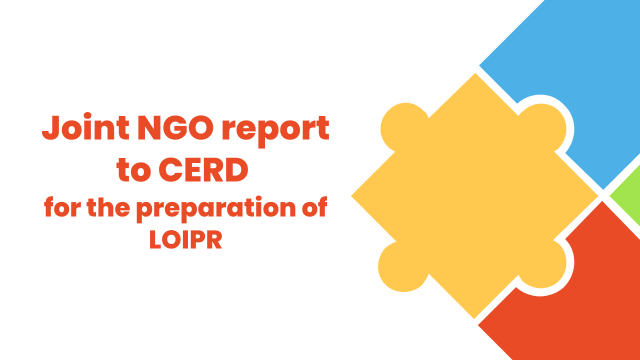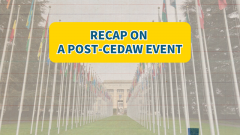Truth, justice, reparation and guarantees of non-recurrence in Sri Lanka (HRC45, 2020, WS)
September 18, 2020
IMADR submitted a written statement on “Truth, justice, reparation and guarantees of non-recurrence in Sri Lanka” at the 45th session of the Human Rights Council. Whole text can be read below or downloaded here. ![]()
———
Truth, justice, reparation and guarantees of non-recurrence in Sri Lanka
Introduction
In 2009, the 26-year civil war in Sri Lanka between the Government of Sri Lanka (GoSL) and the Liberation Tigers of Tamil Eelam (LTTE) ended. The war was characterised with arbitrary arrests, the killing of civilians, enforced disappearances, torture and abductions.[1] Women, especially Tamil women, suffered sexual and gender-based violence by the security forces including rape, sexual slavery and home invasions as highlighted by the Committee on the Elimination of Discrimination against Women (CEDAW).[2]
Following the war, the Government led by then-President Mahinda Rajapaksa failed to investigate violations of international human rights and humanitarian law, hold accountable of those responsible, and provide redress to the victims. While a number of domestic mechanisms were set up such as the Lessons Learnt and Reconciliation Commission (LLRC) and the Commission of Inquiry on Disappearances, they had very limited outcomes.[3]
Progress after 2015
The 2015 Presidential election witnessed the victory of Mathiripala Sirisena. The Government led by then-President Sirisena pledged through co-sponsoring Human Rights Council Resolution 30/1 in 2015 to establish a commission for truth, justice, reconciliation and non-recurrence, an office on missing persons, an office for reparations and a judicial mechanism to investigate allegations of violations of human rights and international humanitarian law. The GoSL co-sponsored the successive Resolutions 34/1 of 2017 and 40/1 of 2019. Yet, among the promised transitional justice mechanisms, only the Office on Missing Persons (OMP) and the Office for Reparation are in place as of August 2020. The domestic justice system failed to bring justice for emblematic cases including the disappearance of journalist Prageeth Eknaligoda, but the GoSL has refused to involve international personnel in investigations into war-related crimes.[4] While the Cabinet approved a proposal to establish an Independent National Commission on Women in 2017,[5] sexual and gender-based violence committed during and after the war remain unaddressed.
In February 2020, the UN High Commissioner for Human Rights warned that the inability to address impunity and reform the institutions responsible for transitional justice fuels the recurrence of human rights violations and the risk of repeating cycles of violence. She also alerted to signs indicating a reversal of the past commitments.[6] Today her concerns are becoming increasingly imminent.
Negative developments since 2019
On 21st April 2019, three churches and three luxurious hotels were attacked by suicide bombers. These attacks caused the death of over 250 people and placed national security back at the centre of the political agenda.[7] On 16th November, Gotabaya Rajapaksa, a candidate from the Sinhalese Buddhist nationalist party Sri Lanka Podujana Peramuna (SLPP) who was the Secretary of Defence, was elected as President. Since then, the GoSL has repeatedly made statements and decisions against transitional justice. On 26th February 2020, the GoSL announced to withdraw from Resolution 40/1 which President Rajapaksa attacked as a “historic betrayal” of the previous government.[8] When outlining his plans to address the issue of missing persons to the UN Resident Coordinator, President Rajapaksa stated that these missing persons were actually dead[9], without any credible investigations. Not only his statement added to the distress of families of the disappeared, but also it violated Sri Lanka’s obligation under the Convention for the Protection of All Persons from Enforced Disappearance (CPED), which it ratified in 2016, to thoroughly and impartially investigate the allegations of enforced disappearances. During the past six months, the interim-government led by President Rajapaksa has seen to the dismantling of the Secretariat for the Coordination of Reconciliation Mechanisms and the Peace Secretariat.
Civil society has expressed concerns on the number of the GoSL’s decisions that undermine democratic governance and the rule of law. Within the first six months of his presidency, President Rajapaksa appointed twenty-four high-ranking military officers to civilian and police positions. The GoSL also announced that the OMP and the Office for Reparations would be continued “with appropriate adaptation in line with Government policy framework”[10], effectively threatening their independence. In March 2020, President Rajapaksa pardoned Sergeant Sunil Rathnayake who had been convicted in 2015 for the murder of eight Tamil civilians including three children in Jaffna in 2000.[11] In June, the Presidential Task Force to “build a Secure Country, Displined, Virtuous and Lawful Society”[12] was established. Headed by Retired Major General Kamal Gunaratne, it has a broad mandate and extensive powers to give directives to “social groups”, all public servants and public institutions such as the Human Rights Commission, the Right to Information Commission and state media.[13] Along with the new Army Commander Shavendra Silva, Retired Major General is mentioned in the 2015 report of the OHCHR Investigation on Sri Lanka for violations of international law. On 31st July, Shani Abeysekara, the former director of the Criminal Investigations Department, was arrested for the allegation of concealing evidence. He had led several high-profile criminal investigations against members of the current government.[14]
In parallel to such militarization, Sinhala Buddhist supremacy is exploited by President which portrays minorities as a threat to the Sri Lankan society. The GoSL refused to include the Tamil language in the national anthem at the celebrations of Independence Day in 2020, although it had been considered as a symbolic gesture towards reconciliation.[15] On 31st March, the Ministry of Health revised the guidelines to require bodies of the victims of COVID-19 to be cremated. This de facto prevents the Muslim community from respecting their religious traditions. Not only it is discriminatory to the minority community, but also it is inconsistent with the World Health Organisation’s guideline which allows both cremation and burial.[16] The Task Force for Archaeological Heritage Management in the Eastern Province is entirely composed of members from the Sinhala community with only Buddhism represented in its membership, despite the fact that the Province is equally populated by Tamils, Muslims and Sinhalese. The Tamil and Muslim communities fear that their rights, in particular the freedom of religion or belief and cultural rights, will be undermined. Such intensifications of Sinhala Buddhist nationalism hamper reconciliation.
Those developments clearly indicate the GoSL’s failure to adhere to its obligations under international law to achieve transitional justice. In May, President even stated that, “If any international body or organization continuously targets our country and our war heroes, using baseless allegations, I will also not hesitate to withdraw Sri Lanka from such bodies or organizations.”[17] The limited progress made since 2015 is at a high risk of backtracking.
Worrying signs from the 2020 Parliamentary elections
As a result of the Parliamentary elections on 5th August 2020, the presidential party won with 59.1% of the votes, with only five seats to the two-thirds majority.[18] It is concerned that the new Parliament will not commit to advance justice, accountability and minority rights due to its dominance by Sinhala Buddhist nationalists.[19]
Together with its traditional political allies, the presidential party can have the two-third majority of the Parliament. This allows President Rajapaksa to revoke the 19th amendment to the Constitution which reduced the power of the Executive Presidency.[20] Such a revocation would significantly weaken checks and balances on the executive and critically jeopardise the independence of the judiciary and relevant commissions. The first cabinet meeting of the new government has approved the revamping of the 19th amendment and to introduce a 20th amendment in early September. The challenge would be to see if Sri Lanka does not collapse into nationalist authoritarianism with a highly centralised executive with an overreliance on the military for its success. This was well demonstrated during the COVI-19 pandemic as President virutally governed the country without a Parliament.
Against this back drop, we recommend:
- The Special Rapporteur on the promotion of truth, justice, reparation and guarantees of non-recurrence to follow-up on the human rights situation in Sri Lanka in coordination with other special procedures mandates holders of the Human Rights Council, especially those who undertook official visits since 2015, and coordinate joint actions in order to hold Sri Lanka accountable to his recommendations; and
- The Human Rights Council to establish an international accountability mechanism on Sri Lanka.
[1] A/HRC/30/CRP.2, paragraph 4.
[2] C/LKA/CO/8, paragraph 24(b).
[3] A/HRC/25/23, paragraphs 31 and 67.
[4] A/HRC/40/23, paragraph 27.
[5] C/LKA/CO/8, paragraph 18.
[6] A/HRC/43/19, paragraphs 7 and 36.
[7] A/HRC/43/19, paragraph 12.
[8] ColomboPage, Sri Lanka government confirms withdrawal from UNHRC consensus resolutions, 19 February 2020. http://www.colombopage.com/archive_20A/Feb19_1582125970CH.php
[9] Presidential Secretariat, UN Resident Coordinator delighted with President’s sustainable development programs, January 2020. https://www.presidentsoffice.gov.lk/index.php/2020/01/17/un-resident-coordinator-delighted-with-presidents-sustainable-development-programs/?lang=en
[10] Statement of Sri Lanka to the 43rd session of the Human Rights Council, 27 February 2020. https://www.un.int/srilanka/news/agenda-item-2-general-debate-presentation-written-update-implementation-hrc-resolution-301-high
[11] Groundviews, Justice in the Time of a Pandemic, 29 March 2020. https://groundviews.org/2020/03/29/justice-in-the-time-of-a-pandemic/
[12] Sri Lanka Briefing Notes, A deadly combination – militarisation, Sinhala Buddhist supremacy and absence of rule of law, July 2020. https://srilankabrief.org/2020/07/sri-lanka-briefing-note-no-17-a-deadly-combination-militarisation-sinhala-buddhist-supremacy-and-absence-of-rule-of-law/
[13] Ibid
[14] Human Rights Watch, Sri Lanka: Increasing Suppression of Dissent, 8 August 2020. https://www.hrw.org/news/2020/08/08/sri-lanka-increasing-suppression-dissent
[15] A/HRC/43/19, paragraph 26.
[16] AL LKA 2/2020, paragraph 4.
[17] Full text of the speech made by President Gotabaya Rajapaksa at the National Ranaviru Day commemorations, 19 May 2020. https://www.un.int/srilanka/news/full-text-speech-made-his-excellency-president-gotabaya-rajapaksa-national-ranaviru-day
[18] Manthri.lk, Vote-to-Seat Tracker, August 2020. http://election2020.manthree.lk/
[19] Journalists for Democracy in Sri Lanka, Sri Lanka: Victims the losers in Sinhala Buddhist landslide, 10 August 2020. http://www.jdslanka.org/index.php/analysis-reviews/politics-a-economy/961-sri-lanka-victims-the-losers-in-sinhala-buddhist-landslide
[20] A/HRC/43/19, paragraph 25.





